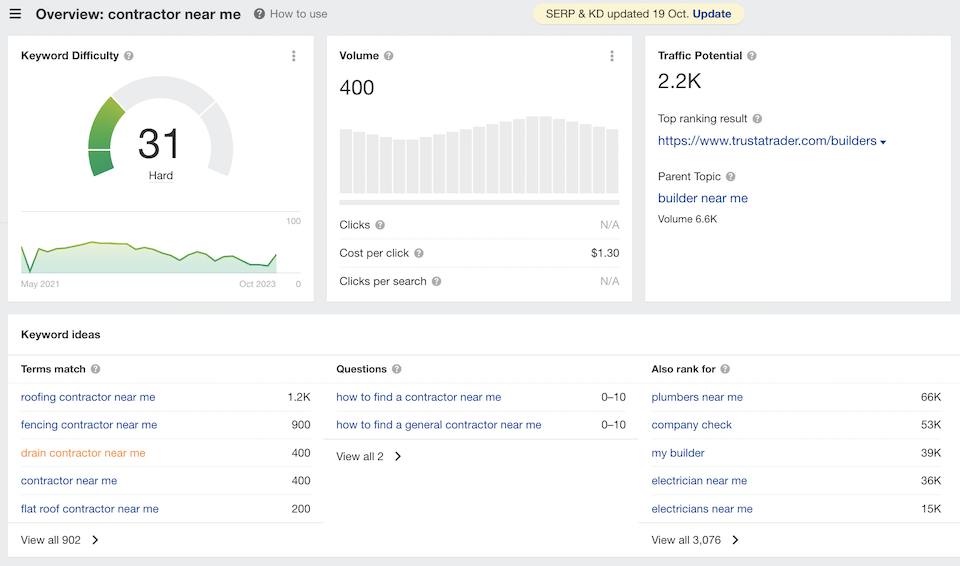Want to master construction SEO? You’ve come to the right place.
If you run a trade or construction business, you’ll know all too well how saturated the market is.
In order to rise above the competition, you’ll need a foolproof construction marketing strategy that focuses on getting you found. And, what should be top of your list when creating that strategy? You guessed it. SEO.
According to research, 70% of marketers agree that SEO generates more sales for their business than paid advertising. So, if you want to up your game and convert more customers, SEO should never be overlooked.
In this comprehensive guide, we’ll be sharing some of the secrets behind our specialist SEO services and helping you to conquer the world of online construction, one backlink at a time!
SEO topics we’ll be covering:
- The Importance Of SEO For Construction Companies
- How Construction SEO Works
- A Closer Look At Keywords
- Link Building In More Detail
- Construction SEO Quick Wins
- Long-Term SEO Strategies For Construction Companies
- Checking In With Your Construction Competitors
- Pairing SEO With PPC
- Getting Help With Construction SEO
Let’s get stuck in!
The Importance Of SEO For Construction Companies
If you’ve ever sat there and wondered, “Is SEO really that important for my construction business?”, listen up – this section is for you.
You might be familiar with the phrase “Learn a trade and you’ll have a job for life.” In fact, if you were sensible enough to listen to that advice, that might just be the reason that you do what you do now.
Anyway, back to the point.
Providing a service or product that fulfils a customer need rather than just a want, is an excellent business strategy. By running a construction company, you’re securing business by tapping into a consistent and essential demand. However, sadly, you’re not the only person offering that service. Your competitors did what you did, they too were told to take up a trade, and they too wanted a piece of the construction pie!
Fast forward a few years and, unfortunately, what was once an already saturated market, is now an even more saturated market thanks to everybody’s favourite global network – the World Wide Web.
Countless businesses just like yours have a slick custom-built website, a string of social media profiles, a Google My Business Account, and an expert digital marketing agency working behind the scenes, helping them to fight for a spot in the digital limelight.
Technologies are becoming more sophisticated, algorithms are becoming increasingly advanced, and some competitors are even using dirty digital tactics to stay ahead of the game.
This is why SEO is important for construction companies.
Even if you don’t have the funds to invest in a full-scale marketing package, at the very least, you need to be practising SEO.
How Construction SEO Works
Now that we’ve established the importance of SEO for construction companies, let’s explore how it all comes together.
SEO stands for “search engine optimisation”. Simply put, this means optimising something so that it can be found by search engines, and, so that internet users can find the information that they’re looking for.
You might optimise a construction web page, a header image, a merchant mobile app or a blog article. Regardless of what it is that you’re optimising, your main goal is to get it found.
For construction SEO, we take a number of strategic approaches to improve online visibility.
These are some of the essentials but not an exhaustive list (we’ll go into further detail later on in the article):
Construction Keywords
For any solid SEO strategy, you need to do keyword research.
Identifying the specific words and phrases (known as keywords) that potential clients use in their search queries is crucial. These keywords become the foundation of your SEO strategy, guiding the way your website connects with online searchers.
Optimising Your Construction Page
Next, your website requires meticulous optimisation. This involves strategically adding your chosen keywords to your website, improving your site’s structure and ensuring that it functions seamlessly across various devices.
Engaging content plays a pivotal role in this process. Crafting content that not only demonstrates quality but also directly addresses the questions and needs of potential customers or clients, is essential.
Think how-to guides, industry top tips and business FAQs.
By using your webspace wisely, you’ll not only please search engines, but you’ll also show prospective customers that you’re helpful and reliable. It’s a win-win approach.
Building Online Authority
To strengthen your authority online, you need backlinks. Backlinks show both Google and your visitors, that you are endorsed by reputable websites.
When respected sites link to your content, it sends a strong signal to search engines that your material is both valuable and trustworthy, significantly enhancing your search rankings.
A quick word of warning regarding link building. Not all backlinks are equal.
If you acquire too many unnatural or spammy backlinks, search engines can sniff them out and penalise your website for having them. So, instead of trying to build links here, there and everywhere, focus on building high-quality, relevant, and organic backlinks from reputable sources. That way, you’ll stay in Google’s good books and maintain a healthy rank.
Nurturing Your SEO Strategy
It’s vital to remember that SEO is an ongoing process. To reap its benefits, you need to be constantly monitoring your website’s performance, tracking the progress of your keywords in search rankings, and making necessary adjustments. If you only optimise once and leave your website to do its thing, you can wave bye-bye to page 1 of Google.
Neglecting SEO is a surefire way to send your website straight to the forgotten corners of the internet. So, prioritise your precious SEO, it’s one of the key ways to stay current online!
A Closer Look At Keywords
Now we know the basics of construction SEO, it’s time to dig a bit deeper into keywords.
Let’s explore where you can find these digital gems and how they guide customers and clients to your digital doorstep.
Keyword Tools
Before you add keywords to a website, you have to find them. And, to do that, you need to use subscription-based keyword tools such as AHrefs and SEMrush.
These robust platforms allow you to uncover a treasure trove of keywords that potential customers are using to find construction services.
Say, for example, your customers or clients are looking for an “interior design expert” in the local area. Your keyword tool will display that keyword along with a range of alternative phrases and related terms that your customer might be looking for.
You might see:
“Interior design specialist”
“Expert designer near me”
“Local interior specialist”
You get the idea.
Next to these keywords, you’ll see different types of numeric data. Two of the most important figures that you need to bear in mind are search volume and keyword difficulty. This is how they work:
Search Volume
Your search volume is simply the number of average searches for that keyword. Some keywords have a high search volume, indicating a larger pool of people searching for those terms. Others have lower search volumes, suggesting that fewer individuals are using those keywords to find construction services.
Keyword Difficulty
Keyword difficulty measures how challenging it is to rank well for a particular keyword. Some keywords are highly competitive, making it more difficult to rank for them. Others are like hidden treasures waiting to be discovered, offering an easier path to success.
As you explore these tools, you’ll encounter a spectrum of keywords, each with its own unique characteristics. High search volume keywords can be tempting, but they often come with higher keyword difficulty. On the flip side, lower search volume keywords may be easier to rank for but might not bring as much traffic.
The art of keyword research is finding that sweet spot – keywords with a large search volume and manageable keyword difficulty.
Search Location
Next, you need to ensure that your keyword results are set to your region so that you’re not seeing keywords from other places that won’t be relevant to your business.
A common school-boy error is going after a keyword that’s popular in another country without selecting a search location.
If you’re a UK-based trade business looking for local customers and you start optimising your site for keywords like ‘faucet repairs’ or ‘laborers near me’, okay – you might rank well in Ohio or Chicago, but people in the UK won’t know you exist!
Pay close attention to the geographic area that your search terms are coming from and err on the side of caution if you start noticing strange results or keywords with American spellings.
Keyword Length
When doing your research, you also need to consider looking at both long-tail and short-tail keywords.
What does this mean?
Well, a keyword could simply be two short words, such as, “local gardener” or it could be a longer phrase like “eco-friendly gardener in Bristol”. Although long-tail keywords are more niche and may not draw as many searches, they can offer an advantage given that they tend to have less competition, making it easier to rank well.
The most important thing to remember is that your choice of keywords can make or break your SEO success. You need to take a careful and considered approach when carrying out keyword research to make sure you’re getting the most out of your construction SEO efforts.
Link Building In More Detail
We’ve covered keywords, now it’s time to shed light on how we can go about building those all-important backlinks.
There are a number of different approaches you can take to build backlinks for your website.
However, one of the best places to start is with well-written content.
The idea of backlinking is that you reach out to other websites, particularly influential blogs or industry-related platforms, to propose guest blogging opportunities. Therefore, in order to stand any chance of getting featured on these websites, these businesses need to see that you are producing high-quality content that is relevant to their target audience.
If you approach a website owner asking for backlinks and they notice that your content is short, low effort or lacking in detail, don’t be surprised if you get hit with the silent treatment.
Think about it from the perspective of a business owner. If you had agreed to provide a link to somebody else’s website, you’d be condoning that website and indirectly telling your visitors that you vouch for its quality and credibility. Therefore, you’d want to make sure that their content was well structured, carefully researched and free from any spelling and grammar mistakes.
And this credibility doesn’t just apply to content, it applies to the whole site. When you pitch for backlinks, the owners want to know that your company is trustworthy and reliable. That’s why it can be helpful to showcase testimonials, provide links to your social platforms, and share case studies. These things help to substantiate your business claims and show others that you aren’t just paying lip service.
Of course, not every website will check your content in as much detail. For example, there are guest blogging sites that take content submissions automatically or that don’t require an approval process. However, when approaching these sites you also need to question their authority otherwise you could harm your website’s credibility.
With free online publishing platforms, it’s important to check the site’s domain authority (this is basically a search engine rank score), the types of links that they support (Dofollow or Nofollow) and the amount of traffic that they receive.
There are plenty of guest blogging sites out there that are reliable but it’s vital that you know what to look for. Choosing the wrong one could lead Google to think that your website is spammy or untrustworthy. That’s why it’s strongly suggested to seek support or advice from a credible content marketing agency before attempting to backlink.
Construction SEO Quick Wins
So, let’s say you’re new to SEO or you’ve neglected your marketing for a while and want to find some simple ways to increase your online visibility.
What can you do?
Well, firstly, it’s important to note that SEO is never really a “quick fix”. SEO is a slow burner. It takes time for Google to recognise your efforts and reward you with improved rankings. However, when you get it right, it’s well worth it!
Here is a quick checklist you can use to start enhancing your SEO straight away:
Internal Links: Backlinks aren’t the only way to please Google. Internal links, i.e., links that allow visitors to navigate from one page on your site to another, can help to boost your search engine rankings in a number of ways. Firstly, internal links allow the search engine to recognise the logical and hierarchical structure of your website. This structure makes it easier for crawlers to navigate and index the site.
Secondly, your links can improve keyword relevance. When you use internal links with relevant anchor text (the clickable text of the link), it tells search engines what the linked page is about. For example, if you had a web page dedicated to bespoke shelving, and that page was built to target the keyword “custom bespoke shelving”, you would use this keyword in your anchor text when linking to that page.
Dead Links: When auditing your construction website, always keep an eye out for broken links! Broken links can harm user experience and disrupt the flow of information which can indirectly affect your SEO. To address this issue, regularly inspect your site and fix any broken links promptly using a broken link checker tool. This is the easiest way to keep your site clean and functional.
Meta Titles and Descriptions: Meta titles and descriptions provide a clear overview of what’s inside each page, helping visitors understand the page’s purpose and content. You’ve probably seen them a thousand times before when searching on Google. They’re displayed as a short headline and snippet of text that appears in the search results.
Although only meta titles have a direct effect on rank, it’s important to optimise both your meta title and description with the page’s relevant keywords in order to provide value to the searcher. If you use the keyword that the searcher is looking for, they’re much more likely to click on your page because you’re showing that your content is relevant.
Keyword Sprinkling: If you’re looking for a quick way to optimise your website, keyword sprinkling is an ideal option. If you can get into the habit of sprinkling your target keywords into your headers and paragraph text whilst keeping your content relevant, your pages will stand a much better chance of being found.
With that being said, it’s crucial to strike a balance between optimisation and user-friendliness. Overusing keywords, also known as keyword stuffing, can result in a poor user experience and even lead to search engine penalties. So, remember, keyword sprinkling should be done in a natural and contextually relevant manner to effectively improve your SEO without sacrificing the quality of your content.
Resizing Large Images: After capturing beautiful images of a recent construction project, it’s natural to want to showcase them on your website BUT be mindful of your page speed!
Large images can drastically slow down your website’s loading speed, affecting user experience. And as we know, user experience affects SEO.
Check the size of your website images and make sure they don’t exceed 200KB. That way you’ll keep visitors happy, stand the best chances of generating conversions and improve your search engine rank position.
Long-Term SEO Strategies For Construction Companies
Ready to go up a gear? If you’re preparing to overhaul your website and dive straight into a long-term construction SEO strategy, here are some other vital components that you should consider.
Building Backlinks from Trusted Sites: Although it’s not an easy feat, cultivating a network of high-quality backlinks from respected websites is a linchpin of long-term SEO success. Choose your guest posting websites wisely and, as we mentioned before, make sure your content is tip-top!
Improving Local SEO with Google My Business: If you want to get found by customers in your local area, having a presence on Google My Business is paramount. A well-maintained business listing increases your visibility and will help you to become the go-to choice for construction services in your local community.
Producing Consistent, SEO-Optimised Content: A carefully structured content strategy is the backbone of long-term SEO success. Regularly creating valuable, construction-related content ensures you stay relevant to your audience and search engines. By optimising your content with relevant keywords, you boost its visibility in search results, keeping your audience engaged and informed.
Enhancing Key Service Pages: Your home page and service pages require your undivided attention. Why? Because they serve as the prime locations for implementing calls to action (CTAs) and driving conversions.
Devote your time to fine-tuning and optimising these pages to offer comprehensive insights into your construction services. As you enhance these pages with specific keywords pertinent to your services, you elevate your search engine rankings for those crucial terms. This is your opportunity to showcase your expertise and compellingly convey why your construction projects are the best choice for prospective clients.
Reviewing SEO Performance Data on a Monthly Basis: Consistent performance monitoring is key to long-term SEO success. Analysing your website’s metrics, such as organic search traffic and conversion rates, enables data-driven decisions to refine your SEO strategy over time. It’s all about staying agile and responsive.
Re-Optimising Old Content: Lastly, don’t forget that your existing content is a valuable asset. You can use your SEO performance data to revisit and re-optimise pages so that they remain relevant and up to date. This not only maintains the quality of your website but also shows search engines that you’re dedicated to providing accurate and valuable information over time.
Checking In With Your Construction Competitors
When it comes to strategising for construction SEO, don’t forget to check out the competition.
It’s time to dissect your competitors!
Look for their strengths and weaknesses. Examine the quality of their content. Check out their keyword choices, loading times, meta titles, post frequency…
The list goes on and on.
By weighing up all of the things that your main competitors do well and not so well, you can find the best ways to level up.
While some of these insights are only accessible with paid tools, the wisdom gained is immeasurable. Looking at what your competitors are doing can provide clarity and lead to that lightbulb moment where you suddenly realise exactly what is that you need to focus on in order to stand out.
Pairing SEO With PPC
Before we wrap up our article, we need to draw your attention to what we consider to be the holy-grail marketing combo for construction businesses. SEO + PPC.
As you’ve learnt already, SEO sets the foundation for long-term visibility, allowing your business to rise through organic search rankings and draw more traffic to your site.
Alone, it’s a steady and sustainable approach to gaining an online presence, however, when you combine it with pay-per-click advertising, it becomes even more powerful.
PPC offers immediate visibility by positioning your business at the top of search results for chosen keywords. Therefore, by putting both SEO and PPC together, you gain comprehensive coverage on search engine result pages, showcasing both your authority and credibility.
This means your website ends up all over the first page of Google, impossible to ignore. Who wouldn’t want that?
The other benefit of combining paid and organic approaches is that you get even more data.
When you analyse both your SEO and PPC data for trends and patterns, it becomes a lot easier to not only draw wider conclusions about your online performance, but also strategise and target your customers more effectively. The more data you have on your customers, their journeys and what they are looking for, the stronger your business will become.
Getting Help With Construction SEO
Okay, we know what you’re thinking. SEO seems like a lot to take in.
And, despite the fact that we’ve covered what might feel like a large chunk of the topic, the truth is, we’ve only just scratched the surface.
To be successful at construction SEO, you need to be dedicated. Much like SEO itself, mastering its execution is a gradual process, not an instant solution. It takes time, patience and a commitment to continuous learning.
If you’re a construction business owner and are curious to know more about SEO but aren’t sure where to start, get in touch!
Over the years, we’ve helped countless construction businesses in the South West to achieve SEO success and we’ve always got room for one more…
Book a call in the diary for a free 30-minute chat with our head of marketing, Rich. Or, send us an email to hello@flex-digital.net. We can’t wait to hear from you!















